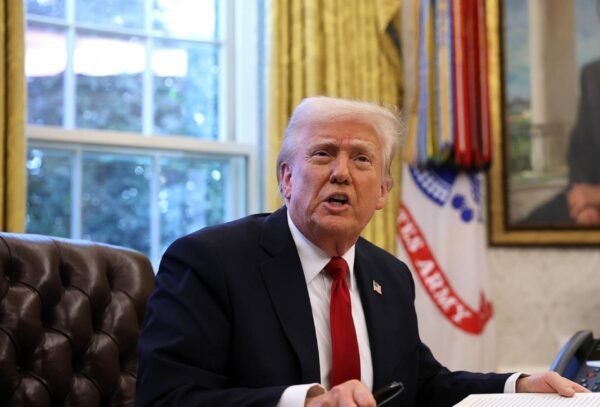Why Trump says Greenland takeover needed for ‘world peace’?

Donald Trump’s recent comments regarding the potential takeover of Greenland have sparked significant discussion, particularly his assertion that such an action is necessary for “world peace.” During a press conference, Trump emphasized that the acquisition of the strategically located and resource-rich territory is not solely about U.S. interests but is crucial for global security. He stated, “We are not talking about peace for the United States. We are talking about world peace. We are talking about international security”.
Trump’s rationale is rooted in concerns over increasing Chinese and Russian naval activity in Arctic waters, which he believes poses a threat to international stability. He remarked, “Currently, if you observe Greenland and its waterways, you will see Chinese and Russian vessels scattered throughout”. He argued that relying on Denmark or other nations to manage these security issues is insufficient, asserting that the U.S. must take a proactive role in ensuring safety in the region.
Additionally, Trump acknowledged the implications of climate change on Arctic geopolitics, suggesting that melting ice has made Greenland more relevant to U.S. security than ever before. He noted that “with contemporary weaponry and the melting ice, its relevance to U.S. security has escalated”. This perspective aligns with his broader narrative that emphasizes the need for American dominance in strategic areas to maintain global peace.
The administration’s approach has drawn criticism from both Greenlandic and Danish officials, who have expressed opposition to any notion of selling or transferring sovereignty over Greenland. Despite this, Trump remains adamant about the strategic importance of Greenland in the context of U.S. national security and international relations.
Donald Trump has claimed that a U.S. takeover of Greenland is necessary for “world peace” due to a combination of strategic, security, and geopolitical concerns he has articulated. He argues that controlling Greenland is vital not just for U.S. national security but for global stability. On March 28, 2025, Trump stated at the White House, “We are not talking about peace for the United States. We are talking about world peace. We are talking about international security.” This reflects his view that Greenland’s position and resources are critical to countering threats from adversarial powers, particularly Russia and China, in the Arctic region.
Trump’s rationale ties to Greenland’s strategic location as a gateway to the Arctic and North Atlantic, areas increasingly contested due to melting ice opening new shipping routes and access to resources. He has pointed to the presence of “Chinese ships all over the place” and “Russian ships all over the place” near Greenland, suggesting that U.S. control would prevent these nations from dominating the region. The island hosts a significant U.S. military presence, including the Pituffik Space Base, which is key for missile defense and monitoring Arctic activities. Trump and his allies, like Vice President JD Vance, emphasize that if the U.S. doesn’t lead in the Arctic, powers like China and Russia will fill the vacuum, potentially destabilizing global security.
Additionally, Greenland’s vast mineral wealth, including rare earth elements essential for advanced technology and clean energy, underpins Trump’s argument. He sees securing these resources as a way to bolster U.S. economic and military strength, which he frames as a foundation for maintaining world peace. His comments also coincide with actions like Vance’s visit to a U.S. base in Greenland on the same day, signaling intent to press this agenda.
However, this stance has drawn skepticism and opposition. Greenland’s leaders, like outgoing Prime Minister Múte Egede, and Denmark, which governs the territory, reject the idea, asserting Greenland’s autonomy and right to self-determination. Critics argue that Trump’s approach echoes outdated imperialistic thinking rather than a genuine peacekeeping strategy, and his refusal to rule out military or economic coercion raises concerns about escalating tensions rather than fostering peace.
